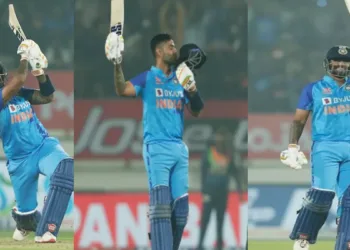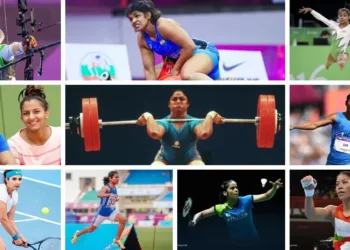In a landmark moment for Indian cricket, Shubman Gill is poised to become the next captain of the Indian Test team. This development comes in the wake of Rohit Sharma’s sudden retirement from Test cricket, which has left the Board of Control for Cricket in India (BCCI) scrambling to appoint a new leader ahead of the crucial five-match Test series against England.
The young Punjab batsman, admired for his elegant stroke play and composed temperament, has reportedly met with chief selector Ajit Agarkar and head coach Gautam Gambhir to discuss the future direction of the Indian Test team.
This blog post delves deep into what this captaincy change means for Indian cricket, the challenges ahead, and why Shubman Gill is the perfect fit to lead the team into a new era.
Table of Contents
Rohit Sharma’s Abrupt Retirement: A Leadership Vacuum

Rohit Sharma’s decision to retire from Test cricket just before the England series has sent shockwaves through the cricketing community.
Rohit, who had been a key figure in India’s Test setup and captaincy framework, left the BCCI with little time to find a suitable replacement. His retirement has created a leadership vacuum at a critical juncture, forcing the selectors and the board to act swiftly.
The timing of Rohit’s exit is particularly challenging because the England tour is one of the toughest assignments for any Test team. England’s home conditions, known for their swing and seam-friendly pitches, demand not only technical skill but also strong leadership to navigate the team through adversity.
The BCCI’s urgent task is to appoint a captain who can inspire confidence and lead India with strategic acumen.
Why Shubman Gill Is the Natural Choice
Shubman Gill’s rise in Indian cricket has been nothing short of spectacular. From his early days as a prodigious talent in domestic cricket to becoming a mainstay in the Indian Test batting lineup.
Gill has consistently impressed with his technique, temperament, and maturity beyond his years. At just 25, he embodies the perfect blend of youth and experience, making him an ideal candidate to lead the team.
Gill’s recent meetings with Ajit Agarkar and Gautam Gambhir reportedly focused on discussing the team’s future roadmap, signaling the selectors’ confidence in his leadership potential. His calm demeanor under pressure, ability to build innings patiently, and tactical understanding of the game make him well-suited to captaincy, especially in challenging overseas conditions.
Moreover, appointing Gill as captain aligns with the BCCI’s vision of investing in young leaders who can build a sustainable future for Indian cricket. His leadership will bring fresh energy and a new perspective to the team, which is essential as India looks to maintain its dominance in the longest format of the game.
The Virat Kohli Factor: A Missed Opportunity?
Initially, the selectors considered Virat Kohli for the captaincy role. Kohli, with his vast experience and previous successful stint as India’s Test captain, was a natural contender. However, Kohli has reportedly expressed his intention to retire from Test cricket, a decision that has complicated the BCCI’s plans.
The board has urged Kohli to reconsider his retirement, recognizing the value of his leadership and batting prowess. Yet, as of now, Kohli has not given a definitive response. This uncertainty has further cleared the path for Shubman Gill to take over the reins, marking a generational shift in Indian cricket leadership.
Kohli’s potential exit also raises questions about the team’s middle-order stability and experience. His leadership qualities and aggressive style have been instrumental in India’s recent successes, and his absence will be felt both on and off the field. However, this transition also opens opportunities for emerging players to step up and fill the void.
Jasprit Bumrah and the Leadership Dynamics

Another key figure in the leadership discussion is Jasprit Bumrah, India’s premier fast bowler. Bumrah had served as stand-in captain during Rohit Sharma’s absence in the Border-Gavaskar Trophy, showcasing his leadership potential. However, the BCCI reportedly does not want to burden Bumrah with captaincy responsibilities, especially considering his workload and injury management.
Bumrah is unlikely to play all five Tests in England due to workload management strategies, which makes it impractical to assign him vice-captaincy or leadership roles that require consistent presence. The selectors are therefore cautious about overloading key players with additional responsibilities, preferring to focus on their primary roles.
This cautious approach reflects the BCCI’s broader strategy to manage player fitness and longevity, especially with a packed international calendar ahead. It also underscores the importance of grooming dedicated leaders like Shubman Gill who can focus solely on captaincy duties.
What This Means for Indian Cricket’s Future
Shubman Gill’s appointment as Test captain is more than just a change in leadership; it signals a new chapter for Indian cricket. The England Test series will be a baptism by fire for Gill, testing his ability to lead in some of the most challenging conditions in world cricket.
Gill’s leadership style, characterized by calmness and strategic thinking, will be crucial in managing a team that is in transition. His ability to nurture young talent, maintain team morale, and make tactical decisions on the field will be under intense scrutiny.
This transition also reflects the BCCI’s commitment to building a team for the future. By investing in young leaders like Gill, India aims to create a core group that can sustain success over the next decade. It is a move that balances experience with youth, ensuring that Indian cricket remains competitive at the highest level.
The Upcoming England Test Series: A Defining Moment
The five-match Test series against England is shaping up to be a defining moment for Shubman Gill and the Indian team. The squad announcement expected around May 23 or 24 will provide clarity on the team composition and leadership structure.
England’s home conditions are notoriously difficult for visiting teams, with swinging conditions and seaming pitches that test batsmen’s technique and patience. Gill’s ability to lead from the front with the bat and inspire his teammates will be critical.
This series will not only test India’s cricketing skills but also the leadership qualities of its new captain. How Gill handles the pressures of captaincy on foreign soil will set the tone for his tenure and influence the team’s performance in the years to come.
Final Thoughts: A New Dawn for Indian Test Cricket

The cricketing world is abuzz with anticipation as Shubman Gill prepares to take on the mantle of India’s Test captaincy. His journey from a promising youngster to the leader of one of the world’s strongest Test teams is inspiring and full of promise.
While challenges lie ahead, Gill’s calm and composed approach, combined with his cricketing prowess, makes him a beacon of hope for Indian cricket’s future. His leadership will be pivotal in navigating the team through a period of transition and establishing India as a dominant force in Test cricket.
As the BCCI gears up to make the official announcement, fans can look forward to a fresh leadership era filled with promise, passion, and the pursuit of excellence. The future of Indian Test cricket looks bright with Shubman Gill at the helm.
FAQ:-
Who will be the next captain of India?
Shubman Gill has emerged as the frontrunner to replace Rohit Sharma as the full-time Test captain starting with India’s Test tour of England, a five-Test series starting on June 20 at Headingley.
Is Gill a good captain?
The 25-year-old Gill is seen as a long-term prospect having already been appointed as India’s vice captain in both white-ball formats. Gujarat assistant coach Parthiv Patel is among those impressed by Gill’s captaincy. “One can feel his presence in the dressing room.








